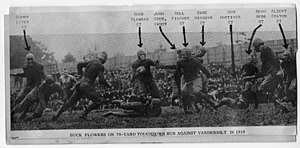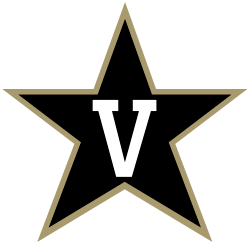Georgia Tech–Vanderbilt football rivalry
| First meeting |
November 19, 1892 Vanderbilt 20, Georgia Tech 10 |
|---|---|
| Latest meeting |
September 17, 2016 Georgia Tech 38, Vanderbilt 7 |
| Trophy | Gold Cowbell |
| Statistics | |
| Meetings total | 38 |
| All-time series | Georgia Tech leads, 20–15–3 |
| Largest victory | Georgia Tech, 83–0 (1917) |
| Longest win streak | Vanderbilt, 7 (1929–35) |
| Current win streak | Georgia Tech, 6 (1966–2016) |
The Georgia Tech–Vanderbilt football rivalry is an American college football rivalry between the Georgia Tech Yellow Jackets and Vanderbilt Commodores. Both universities are founding members of the Southeastern Conference (SEC).
History
In 1904, Dan McGugin was hired at Vanderbilt and John Heisman was hired at Georgia Tech. In 2016, a trophy for the contest, the Gold Cowbell,[1] was unearthed after almost 70 years of dormancy.[2][3][4]
Notable games
1906: Manier scores five touchdowns
The 1906 Vanderbilt team was one of the strongest in its history. Owsley Manier rushed for five touchdowns on Tech. Lob Brown scored for Tech. Sportswriter Alex Lynn wrote after the game that Manier was: "the greatest fullback and all round man ever seen in Atlanta."[5]
1907: Heisman's worst loss at Tech
Vanderbilt beat Georgia Tech 54–0. "The rooters stridently called: "We want sixty! We want sixty!"[6] The highlight of the first half came on a triple pass. Sam Costen passed the ball to Honus Craig, Craig passed it to Morton and Morton passed it to Bob Blake, who ran to the side and passed it 25 yards back to Costen. Costen ran the remaining 20 yards for a touchdown.[7]
1917: Vanderbilt's worst loss
The 1917 Georgia Tech team was the South's first national champion. Despite Vanderbilt having a respectable team, Tech beat Vanderbilt 83–0, the worst loss they have ever suffered. "It was not until 1917 that a Southern team really avenged long-time torment at McGugin's hands. And it took one of history's top backfields–Joe Guyon, Ev Strupper, Al Hill, and Judy Harlan of Georgia Tech–to do it," wrote Edwin Pope.[8] Guyon was the game's star; according to Morgan Blake, "Guyon has been great in all games this year. But Saturday he was the superman".[9]
Vanderbilt captain Alf Adams praised the Tech team: "Tech's magnificent machine won easily over Vanderbilt. It was simply the matter of a splendid eleven winning over an unseasoned, inexperienced team. Tech played hard, clean football, and we were somewhat surprised to meet such a fair, aggressive team, after the reports we had heard. I think that Vanderbilt could have broken that Tech shift if we had had last year's eleven. Being outweighed, Vanderbilt could not check the heavy forwards, or open up the line. Thereby hangs the tale."[10]
1919: Vanderbilt loses in the mud

In Heisman's final year at Tech, Vanderbilt suffered its only loss on the year in the mud, 20–0 against Georgia Tech. Halfback Buck Flowers and fullback Bill Gaiver starred.[11] Flowers had a 78-yard touchdown run. Vanderbilt's captain was Josh Cody.
1920: Flowers and Barron run up a large score
With Flowers and Red Barron in the backfield, SIAA champion Tech defeated Vanderbilt 44–0. During the scoring barrage, Flowers converted a 44-yard drop kick field goal. In the fourth quarter, a fight broke out between Vanderbilt's Gink Hendrick, and some Tech players and fans. No ejections could be made since too many players were involved.
1924: Wakefield's field goal beats Tech
All-American Hek Wakefield scored on a 37-yard drop kick field goal for Vanderbilt's first win in Atlanta since 1906.[12] Wakefield was considered the greatest drop kicker in Vanderbilt history.[13] The Gold Cowbell trophy was introduced after this game.
1925: Wright should run for governor
Describing the most spectacular play he ever saw, coach William Alexander cites one from the 1925 game against the Vanderbilt. Doug Wycoff was hurt, and his substitute Dick Wright was sent in with only minutes to go in the game. On a muddy field, Wright ran off tackle and dodged Vanderbilt's safety Gil Reese, "usually a sure tackler," to get the touchdown that gave Tech a 7–0 victory.[14] The yearbook remarked, Wright "should have run for governor of Georgia right after he ran 56 yards against Vandy."
1927: Spears and Armistead held scoreless
On a wet field, Tech's strong defense held the high scoring Vanderbilt team, including Hall of Famer Bill Spears and high scorer Jimmy Armistead, to a scoreless tie.[15]
1928: national champions end Commodores title hopes
Georgia Tech ended the Jimmy Armistead-led Vanderbilt Commodores' hopes of a southern title with a 19–7 victory.[16] Tech went on to win the Rose Bowl and a national title.
Georgia Tech's first touchdown came on a 45-yard (41 m) pass from Tom Jones to Warner Mizell on a triple pass play.[17] Georgia Tech's next score came on an end run from Mizell. Vanderbilt's lone score came on an 85-yard (78 m) run by lineman Bull Brown after picking up a Stumpy Thomason fumble.[18]
1931: McGugin's trick
Pete Gracey said "In my first varsity year, the night before we played Georgia Tech, Coach McGugin casually walked up to me in the lobby of our hotel, put his arm around my shoulder and sorta whispered, "I was with some Atlanta newspapermen this afternoon and I told them you were the finest sophomore center I had ever coached. I hope that I haven't made it embarrassing for you" We beat Tech, 49 to 7. Afterward I talked to seven other players and you know, Coach McGugin told them all the same thing he told me."[19]
Game results
| Georgia Tech victories | Vanderbilt victories | Tie games |
| |||||||||||||||||||||||||||||||||||||||||||||||||||||||||||||||||||||||||||||||||||||||||||||||||||||||||||||||||||||||||||||||||||||||||||||||||||||||||||||||||||||||||||||||||||||||||||||||||||||||||||||||||
See also
References
- ↑ https://www.foxsports.com/college-football/story/georgia-tech-and-vanderbilt-are-playing-for-a-cowbell-trophy-091616
- ↑ "Vanderbilt and Georgia Tech will renew forgotten cowbell rivalry". 16 September 2016.
- ↑ "Vanderbilt, Georgia Tech to play for long-lost cowbell trophy".
- ↑ "Georgia Tech and Vanderbilt are playing for a Cowbell trophy". 16 September 2016.
- ↑ Alex Lynn (November 18, 1906). "Brown's Toe and the Wet Cave Score". Atlanta Constitution. p. 1. Archived from the original on March 4, 2016. Retrieved May 11, 2015 – via Newspapers.com.

- ↑ Vanderbilt University (1908). Vanderbilt University Quarterly. 8. p. 50.
- ↑ Grantland Rice (November 17, 1907). "Tech Beaten Down". The Tennessean. p. 9. Retrieved April 9, 2016 – via Newspapers.com.

- ↑ Edwin Pope. Football's Greatest Coaches. p. 344.
- ↑ McCarty, Bernie (February 1988). "Georgia Tech's 1917 backfield, better than the Four Horsemen: Part 1" (PDF). College Football Historical Society Newsletter. 1 (3): 5. Archived from the original (PDF) on May 2, 2016.
- ↑ "Vanderbilt Completely Overwhelmed" (PDF). The Technique. November 6, 1917. p. 4.
- ↑ "Georgia Tech Swamps Vanderbilt, 20 to 0". The Washington Post. October 19, 1919. p. 23. Retrieved May 13, 2016 – via Newspapers.com.

- ↑ Vanderbilt Football 2014 Fact Book, Vanderbilt University, Nashville, Tennessee, pp. 125, 137, 142, 151 (2014). Retrieved August 17, 2014.
- ↑ "Hek Wakefield Funeral Today". The Tennessean. November 20, 1962. p. 34. Retrieved July 7, 2016 – via Newspapers.com.

- ↑ W. A. Alexander (1926). "Forty-Five Yards for Georgia Tech" (PDF). Kansas City Star.
- ↑ Mark Purcell (November 1988). "Spears and Vandy excitement in 1927" (PDF). College Football Historical Society. 2 (1).
- ↑ "Hopes of Vandy in South Circuit Wrecked Today". The Waco News-Tribune. November 11, 1928. p. 6. Retrieved March 1, 2016 – via Newspapers.com.

- ↑ "Tornado Takes Places As Grid King of South". The Anniston Star. November 11, 1928. p. 11. Retrieved May 1, 2016 – via Newspapers.com.

- ↑ "Georgia Tech 11 Whips Vanderbilt". The Oregon Statesman. November 11, 1928. p. 9. Retrieved March 1, 2016 – via Newspapers.com.

- ↑ Traughber, Bill (2011). Vanderbilt Football: Tales of Commodore Gridiron History. The History Press. p. 34. ISBN 978-1-60949-423-0.
- ↑ "Georgia Tech vs Vanderbilt Series History - College Football Database". atr.cfrc.com.

